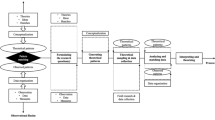Abstract
I propose a version of inferential role theory which says that having a concept is having the disposition to draw most of the inferences based on the stereotypical features associated with this concept. I defend this view against Fodor and Lepore’s objection that it violates compositionality. I show that it is possible to account for productivity and systematicity without assuming compositionality.
Similar content being viewed by others
References
T. Burge (1979) ‘Individualism and the Mental’ A.P. French T. Uehling H. Wettstein (Eds) Midwest Studies in Philosophy 4 University of Minnesota Press Minneapolis 73–121
D. Davidson (1984) Inquiries into Truth and Interpretation Clarendon Press Oxford
J. Fodor (1981) ‘The Present Status of the Innateness Controversy’. in Representations MIT Press Cambridge, MA 257–316
J. Fodor (1994) ArticleTitle‘Concepts: A Potboiler’ Cognition 50 95–113 Occurrence Handle10.1016/0010-0277(94)90023-X Occurrence Handle8039378
J. Fodor (1998a) Concepts: Where Cognitive Science Went Wrong Clarendon Press Oxford
J. Fodor (1998b) ‘There Are No Recognitional Concepts – Not Even RED’. in In Critical Condition MIT Press Cambridge, MA 35–47
J. Fodor (2000) ArticleTitle‘Replies to Critics’ Mind and Language 15 350–374 Occurrence Handle10.1111/1468-0017.00139
J. Fodor E. Lepore (1991) ArticleTitle‘Why Meaning (Probably) Isn’t Conceptual Role’ Mind and Language 6 328–343
J. Fodor E. Lepore (1992) Holism: A Shopper’s Guide Basil Blackwell Oxford
J. Fodor E. Lepore (1996) ArticleTitle‘The Red Herring and the Pet Fish’ Cognition 58 253–270 Occurrence Handle10.1016/0010-0277(95)00694-X Occurrence Handle8820389
J. Fodor E. Lepore (1999) ArticleTitle‘All at Sea in Semantic Space: Churchland on Meaning Similarity’ Journal of Philosophy 96 381–403
J. Fodor E. Lepore (2001) ArticleTitle‘Why Compositionality Won’t Go Away: Reflections on Horwich’s “Deflationary” Theory’ Ratio 14 350–368 Occurrence Handle10.1111/1467-9329.00169
J. Fodor B. McLaughlin (1990) ArticleTitle‘Connectionism and the Problem of Systematicity: Why Smolensky’s Solution Doesn’t Work’ Cognition 35 183–204 Occurrence Handle10.1016/0010-0277(90)90014-B Occurrence Handle2354612
J. Fodor Z. Pylyshyn (1988) ArticleTitle‘Connectionism and Cognitive Architecture’ Cognition 28 3–71 Occurrence Handle10.1016/0010-0277(88)90031-5 Occurrence Handle2450716
J. Hampton (1987) ArticleTitle‘The Inheritance of Attributes in Natural Concept Conjunctions’ Memory and Cognition 15 55–71
P. Horwich (1997) ArticleTitle‘The Composition of Meaning’ Philosophical Review 106 503–531
P. Horwich (2001) ArticleTitle‘Deflating Compositionality’ Ratio 14 369–385 Occurrence Handle10.1111/1467-9329.00170
R. Lahav (1989) ArticleTitle‘Against Compositionality: The Case of Adjectives’ Philosophical Studies 57 261–279 Occurrence Handle10.1007/BF00372697
B. Malt E. Smith (1984) ArticleTitle‘Correlated Properties in Natural Categories’ Journal of Verbal Learning and Verbal Behavior 23 250–269 Occurrence Handle10.1016/S0022-5371(84)90170-1
G. Murphy D. Medin (1985) ArticleTitle‘The Role of Theories in Conceptual Coherence’ Psychological Review 92 289–316 Occurrence Handle10.1037//0033-295X.92.3.289 Occurrence Handle4023146
J. Prinz (2002) Furnishing the Mind MIT Press Cambridge, MA
Putnam H. (1975). ‘The Meaning of “Meaning”’. in Mind, Language and Reality, Philosophical Papers, Vol. 2, Cambridge University Press, Cambridge, pp. 215–271.
W.V. Quine (1960) Word and Object MIT Press Cambridge, MA
G. Rey (1983) ArticleTitle‘Concepts and Stereotypes’ Cognition 15 237–262 Occurrence Handle10.1016/0010-0277(83)90044-6 Occurrence Handle6686511
P. Robbins (2002) ArticleTitle‘How to Blunt the Sword of Compositionality’ Nous 36 313–334 Occurrence Handle10.1111/1468-0068.00373
E. Rosch (1978) ‘Principles of Categorization’ E. Rosch B. Lloyd (Eds) Cognition and Categorization Lawrence Erlbaum Associates Hillsdale 27–48
E. Shoben (1991) ‘Predicating and Nonpredicating Combinations’ P.J. Schwanenflugel (Eds) The Psychology of Word Meanings Lawrence Erlbaum Associates Hillsdale, NJ 117–135
Author information
Authors and Affiliations
Corresponding author
Rights and permissions
About this article
Cite this article
Montminy, M. A Non-Compositional Inferential Role Theory. Erkenntnis 62, 211–233 (2005). https://doi.org/10.1007/s10670-004-0899-2
Received:
Accepted:
Issue Date:
DOI: https://doi.org/10.1007/s10670-004-0899-2




